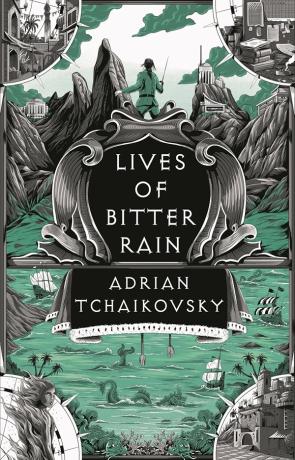Interview with Chris Beckett
The Arthur C Clarke award winning novel Dark Eden has just been released in the USA (published by those good fellows at Crown Publishing) and to celebrate the launch of such an excellent novel the author agreed to let me ask him a few questions:
Ant: Dark Eden manages to create a true sense of an alien world, not least with the inclusion of Geothermal "lantern" Trees. Where did you get inspiration for such an alien world?
Chris: Eden is a sort of inverted world. Here on the surface of the Earth natural objects do not, generally speaking, give off light, but are illuminated by light from the sky. On Eden, the sky is always dark because there is no sun, but trees, plants and even some animals give off light of their own. As I’ve said before, I am fairly certain that I got the original idea for this (which I first used in a story published way back in 1992) from a rather mundane source: the screen of the old Amstrad computer which I had at the time. The screen displayed glowing green letters on a black screen, which inverts the black-on-white printed page in much the same way as Eden inverts Earth.
As I developed the idea, I was also inspired by life in one of the sunless places of Earth, the depths of the ocean, where luminous life is also found. There is geothermally-powered life down there too, around various volcanic vents.
Ant: One of the many ideas presented in the book is that of the story of Eden and consequently, original sin - what encouraged you to write about this subject?
Chris: I’m not a religious person and (in common with many people, religious and otherwise) I don’t think the Bible story is in any way historical. However, I think it does contain profound truths. In particular it deals with the fact that (if I may quote Leonard Cohen for a moment) ‘there is a crack in everything’. We have to live all the time with the fact that life isn’t perfect. There is disappointment, there is pain, there is loss. This gives us a sense of something missing, of a half-remembered place which wasn’t cracked, but which we can never quite reach. Dark Eden is about people learning to cope with that state of permanent loss, and I’m interested in writing about it because I - like the authors of the Bible, who put it right up there at the beginning the book - see it as central to the human condition.
The people of Eden tend to think about this sense of loss in terms of the loss of Earth and its light, caused by a transgressive act performed a long time ago by three astronauts who stole a starship. But they do know that even on Earth things weren’t perfect, and some of the smarter ones are aware that it’s a bit more complicated than that: Jeff, for instance, who sees the longing for another place as pointless, and John, who sees that none of the people in Eden would even exist if it wasn’t for that transgressive act.
Ant: In my review, I remarked on how much thought seems to have gone into how such people could survive in a hostile alien environment, how did you research this?
Chris: I didn’t research it in the conventional sense. I relied on my general knowledge – I am one of those people who squirrel away a lot of information! - and my imagination. That’s all that the people on Eden would have been able to rely on too. When John Redlantern is figuring out how to stay alive on Snowy Dark he has no Google to consult, no books on polar exploration. He just has to try and work out a way of keeping out the cold using the limited resources that are available to him. I simply tried to put myself in his position and, so to speak, do the thinking with him.
Ant: Dark Eden won the Arthur C Clarke award and has received a good deal of acclaim, did you ever expect it would win such a coveted award?
Chris: No, I didn’t! But I did know when I wrote it that I’d come up with my most complex and many-layered piece of writing to date, so I guess I knew it had some potential. It was a long long time in the making, and drew on a great deal of different strands in my thinking and my experience.
Actually one of my other books, The Turing Test, had also won an award a few years previously (the Edge Hill Short Fiction award), and that was even more of a surprise because it wasn’t even a specifically SF award.
Ant: What have you got planned next?
Chris: I am currently putting the finishing touches on a sequel to Dark Eden, to be called Mother of Eden. This is set some two centuries on from Dark Eden, when the human population of Eden is divided into two large groups – the Johnfolk and the Davidfolk – and several smaller ones. The title refers to Gela – Angela Young – the ancestor of everyone on Eden, but also to a young woman called Starlight Brooking, who finds herself wearing Gela’s ring, and being expected to play the role of Gela for an entire community.
You can read our review of the award winning book right here: Dark Eden Review - the book is available in ebook or paper formats in the UK and now the USA.
